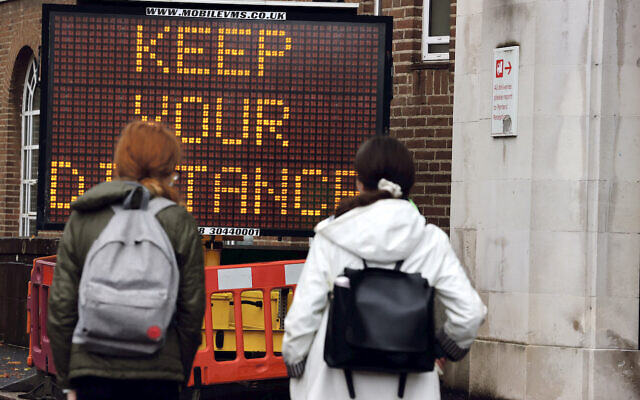Report: Two thirds of UK Jews mentally distressed by virus
Study published by JPR shows levels of anxiety rose across the Jewish population in the UK during the pandemic with young people suffering the most
Jenni Frazer is a freelance journalist
A study published this week by the Institute for Jewish Policy Research (JPR) shows Jews in their late teens and early 20s are more likely than older members of the community to show signs of mental distress as a result of the pandemic.
But data obtained during the July 2020 survey shows that overall, “since the pandemic took hold in March, almost two-out-of-three Jews reported a deterioration in their mental wellbeing”.
The report, Hidden effects: the mental health of the UK’s Jewish population during the COVID-19 pandemic, investigates the extent to which the coronavirus outbreak has affected peoples’ mental health. It is the second in a series of studies carried out by JPR, which will assist in planning for the community’s needs.
The study shows levels of anxiety rose across the Jewish population in the UK in the context of the pandemic. The nearly 7,000 respondents were asked to assess how they had felt over the previous two weeks, based on eight indicators of mental wellbeing. Six indicators were worded negatively: “felt nervous, anxious or on edge”; “felt frustrated”; “felt down, depressed or hopeless”; “felt lonely or isolated”; ‘became easily annoyed or irritable” and “felt bored” and two were worded positively: “felt calm and relaxed” and “felt content”. Each indicator was measured using a five-point scale: Frequently, Often, Occasionally, Rarely, Never.
The figures show that frustration was most likely to be felt frequently or often and was experienced at this level by 31 percent of respondents. This was followed by boredom (28 percent) and general irritability (28 percent).
Respondents were asked whether they felt differently in July from how they reacted in February, before the pandemic took hold in Britain.
The answers, say the JPR, show “a notable decline in mental wellbeing. The greatest changes were in feelings of frustration and feeling nervous, anxious or on edge, with almost half of respondents saying they felt more frustrated and anxious now than before the pandemic”.
Nevertheless, the report says, some people did show markedly less stress. “For example, stress levels might have declined among individuals who no longer had to commute to work, rush to meetings or feel they were missing out on social events, or who simply had more time to appreciate the natural environment”.
The study finds that “Jewish women are more likely than Jewish men to say their mental state overall has taken a turn for the worse since the outbreak began”. But it is the finding about young people that is most striking. The survey has found that “for every mental wellbeing indicator examined, the younger people were, the more likely they were to report mental distress in the two weeks prior to the survey.
JPR executive director and report co-author Dr Jonathan Boyd, said: “The effects of the pandemic on the mental health of young people are particularly troubling… Mental health professionals and community leaders should take heed.”
• The biggest spike in coronavirus-related deaths in the community since early June was recorded this week, with seven funerals in the past seven days. The latest figures released by the Board of Deputies brings the total to 520.

Thank you for helping to make Jewish News the leading source of news and opinion for the UK Jewish community. Today we're asking for your invaluable help to continue putting our community first in everything we do.
For as little as £5 a month you can help sustain the vital work we do in celebrating and standing up for Jewish life in Britain.
Jewish News holds our community together and keeps us connected. Like a synagogue, it’s where people turn to feel part of something bigger. It also proudly shows the rest of Britain the vibrancy and rich culture of modern Jewish life.
You can make a quick and easy one-off or monthly contribution of £5, £10, £20 or any other sum you’re comfortable with.
100% of your donation will help us continue celebrating our community, in all its dynamic diversity...
Engaging
Being a community platform means so much more than producing a newspaper and website. One of our proudest roles is media partnering with our invaluable charities to amplify the outstanding work they do to help us all.
Celebrating
There’s no shortage of oys in the world but Jewish News takes every opportunity to celebrate the joys too, through projects like Night of Heroes, 40 Under 40 and other compelling countdowns that make the community kvell with pride.
Pioneering
In the first collaboration between media outlets from different faiths, Jewish News worked with British Muslim TV and Church Times to produce a list of young activists leading the way on interfaith understanding.
Campaigning
Royal Mail issued a stamp honouring Holocaust hero Sir Nicholas Winton after a Jewish News campaign attracted more than 100,000 backers. Jewish Newsalso produces special editions of the paper highlighting pressing issues including mental health and Holocaust remembrance.
Easy access
In an age when news is readily accessible, Jewish News provides high-quality content free online and offline, removing any financial barriers to connecting people.
Voice of our community to wider society
The Jewish News team regularly appears on TV, radio and on the pages of the national press to comment on stories about the Jewish community. Easy access to the paper on the streets of London also means Jewish News provides an invaluable window into the community for the country at large.
We hope you agree all this is worth preserving.






















